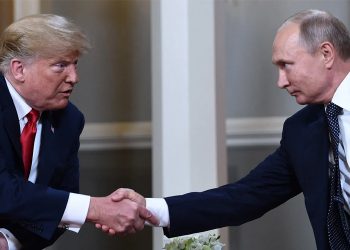WASHINGTON: Joe Biden swears the oath of office on Wednesday to become the 46th president of the United States, taking the helm of a deeply divided nation and inheriting a confluence of crises arguably greater than any faced by his predecessors.
The ceremony in which presidential power is transferred will serve as a jarring reminder of the challenges Biden faces. The inauguration unfolds at a US Capitol battered by an insurrectionist siege just two weeks ago, encircled by security forces evocative of those in a war zone, and devoid of crowds due to the coronavirus pandemic.
Americans were exhorted to stay at home to prevent further spread of a surging virus that has claimed 400,000 American lives. Biden will look out over a capital city dotted with empty storefronts that attest to the pandemic’s deep economic toll and where summer protests laid bare the nation’s renewed reckoning on racial justice.
Biden will not be applauded or likely even acknowledged by his predecessor. Flouting tradition, Donald Trump planned to depart Washington ahead of the inauguration rather than accompany his successor to the Capitol. Trump stoked grievance among his supporters with the claim that Biden’s win was illegitimate.
On his first day, Biden will take a series of executive actions — on the pandemic, climate, immigration and more — to undo Trump’s agenda. Biden comes to office with empathy and resolve born by personal tragedy as well as a depth of experience forged from more than four decades in Washington. At age 78, he will be the oldest president inaugurated.
More history will be made as Kamala Harris becomes the first woman to become vice president. The former US senator from California is also the first Black person and first person of South Asian descent elected to the vice presidency and will become the highest-ranking woman ever to serve in government.
The two will be sworn in during an inauguration ceremony with few parallels in history. Tens of thousands of troops are on the streets to provide security precisely two weeks after a violent mob of Trump supporters, incited by the president, stormed the Capitol in an attempt to prevent the certification of Biden’s victory.
Despite security warnings, Biden declined to move the ceremony indoors and instead will address a small, socially distant crowd on the West Front of the Capitol. Some of the traditional trappings of the ceremony will remain.
The day will begin with a reach across the aisle after four years of bitter partisan battles under Trump. Biden invited Mitch McConnell and Kevin McCarthy, the Republican leaders of the Senate and House, to join him at a morning Mass, along with Democratic leaders Chuck Schumer and House Speaker Nancy Pelosi.
Once at the Capitol, Biden will be administered the oath by Chief Justice John Roberts; Harris will be sworn in by Justice Sonia Sotomayor. The theme of Biden’s approximately 30-minute speech will be “America United” and would be a call to set aside differences during a moment of national trial.
Biden will then oversee a “Pass in Review”, a military tradition that honours the peaceful transfer of power to a new commander in chief. Biden, Harris and their spouses will be joined by former presidents — Bill Clinton, George W. Bush and Barack Obama — to lay a wreath at the Tomb of the Unknown Soldier at Arlington National Ceremony.
Later, Biden will join the end of a slimmed-down inaugural parade as he moves into the White House. In the evening, Biden will take part in a televised concert that also marks the return of celebrities to the White House orbit.
Among those in the lineup include Bruce Springsteen, Justin Timberlake and Lin-Manuel Miranda. Lady Gaga will sing the national anthem at the Capitol earlier in the day.
Trump will be the first president in more than a century to skip the inauguration of his successor. He planned his own farewell celebration at nearby Joint Base Andrews before boarding Air Force One for the final time as president for the flight to his Florida estate.
Biden is eager to go ahead with an ambitious first 100 days that includes a push to speed up the distribution of COVID-19 vaccinations to anxious Americans and pass a $1.9 trillion virus relief package. On Day One, he will also send an immigration proposal to Capitol Hill that would create an eight-year path to citizenship for immigrants living in the country illegally.
He also planned blitz of executive orders on matters that don’t require congressional approval. Among the planned steps include rescinding travel restrictions on people from several predominantly Muslim countries, rejoining the Paris climate accord, issuing a mask mandate for those on federal property, and ordering agencies to reunite children separated from their families after crossing the border.


































